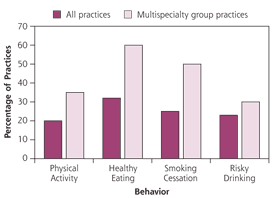
Am Fam Physician. 2007;76(10):1472
Health-related behavioral counseling can and should be a central offering in the medical home. Primary care practices currently address unhealthy behaviors with their patients, but most practices lack the integrated approaches needed to effectively change these behaviors. Revisions in practice and financing are necessary to fully realize this capacity, which could affect the millions of patients served by the largest health care delivery platform in the United States.
Improving unhealthy behaviors, such as physical inactivity, poor diet, smoking, and excessive alcohol use, may reduce the risk of premature mortality and morbidity.1 The effectiveness of helping patients change these behaviors by using an office-based approach has been debated, but a potentially effective approach is the integration of behavioral counseling services within the primary care practice.2,3 A study of 76 practices that participated in Prescription for Health (P4H) assessed their capacities to support behavioral change.4
The practices provided information about their approaches for motivating and supporting patient behavior change. They identified approaches as being integrated within the practice (i.e., involving staff and subspecialists affiliated with or located within the practice, and seeing most patients on referral), providing information, or making outside referrals. Less than 25 percent of the P4H practices used integrated approaches, and most used them to promote healthy eating (see accompanying figure).

All practices have substantial opportunities to help patients address unhealthy behaviors. Among P4H practices, multispecialty group practices were more likely than solo or single specialty group practices to report using integrated approaches. Seventy percent of the multispecialty group practices (14 out of 20) were owned by health systems, suggesting they may have additional system-level resources that support integrated approaches.
Supporting behavioral change may positively impact health, but additional practice support, including appropriate financing, is required to realize this potential in primary care practices. If supported appropriately, integrated health-related behavioral counseling could be a central feature of the medical home.5